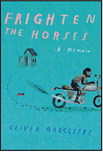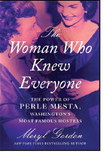Finding your own way. It’s a rite of passage for every young person, a necessity on the path to adulthood. You might have had help with it. You might have listened to your heart alone on the quest to find your own way. And sometimes, as in the new memoir, “Frighten the Horses” by Oliver Radclyffe, you may have to find yourself first.
If you had observed Oliver Radclyffe in a random diner a few years ago, you’d have seen a blonde, bubbly, but harried mother with four active children under age 7 and a distracted husband. You probably wouldn’t have seen trouble, but it was there.
“Nicky,” as Radclyffe was known then, was simmering with something that was just coming to the forefront.
As a young child, Nicky had been raised in comfort in a family steeped in genteel British wealth, attended a private all-girls school, and never wanted for anything. She left all that behind as a young adult, and embraced the biker lifestyle and everything it entailed. The problem now wasn’t that she missed her old ways, it was that she hated life as a wife and mother. Her dreams were filled with fantasies of “exactly who I was: a man on a motorbike, in love with a woman.”
But being a man? No, that wasn’t quite right.
It took every bit of courage she had to say she was gay, that she thought constantly about women, that she hated sex with men. When she told her husband, he was hurt but mostly unbothered, insisting that she tell absolutely no one. They could remain married and just go forward. Nothing had to change.
But everything had already changed for Nicky.
Once she decided finally to come out, she learned that friends had already suspected. Family was supportive. It would be OK. But as Nicky began to experiment with a newfound freedom to be with women, one thing became clear: having sex with a woman was better when she imagined doing it as a man.
In his opening chapter, author Oliver Radclyffe shares an anecdote about the confusion the father of Radclyffe’s son’s friend had when picking up the friend. Readers may feel the same sentiment.
Fortunately, “Frighten the Horses” gets better … and it gets worse. Radclyffe’s story is riveting, told with a voice that’s distinct, sometimes poker- faced, but compelling; you’ll find yourself agreeing with every bit of his outrage and befuddlement with coming out in a way that feels right. When everything falls into place, it’s a relief for both author and reader.
And yet, it’s hard to get to this point because this memoir is just too long. It lags where you’ll wish it doesn’t. It feels like being burrito-wrapped in a heavy-weighted blanket: You don’t necessarily want out, but you might get tired of being in it.
Still, it remains that this peek at transitioning, however painful, is essential reading for anyone who needs to understand how someone figures things out. If that’s you, then consider “Frighten the Horses” and find it.
— The Bookworm Sez



